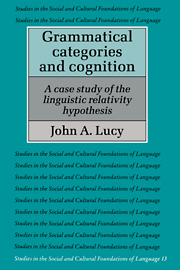4 - Conclusions
Published online by Cambridge University Press: 19 January 2010
Summary
Principal achievements
Language diversity and thought presented a critical analysis of previous empirical research on the linguistic relativity hypothesis and sketched the general theoretical and methodological parameters of an improved approach. The present volume operationalized this approach by developing a specific study comparing nominal number marking in Yucatec Maya and American English. Thus, the study can be evaluated both in terms of its success in meeting the theoretical and methodological goals, and in terms of the significance of the particular substantive findings.
Theoretical and methodological advances
The approach advocated here emphasizes that research on the hypothesis must be based on a comparative analysis of two or more languages, that differences between the languages should be used to generate hypotheses about possible nonlinguistic behavioral consequences, and that these hypotheses should be tested by careful comparative assessment of the individual behavior of speakers of the various languages. Further, it has been argued that such research will proceed most effectively at present if both the linguistic comparison and the language–cognition linkage are anchored in terms of linguistically defined referential categories.
Meeting the theoretical and methodological goals
The linguistic analysis in the present study focused on differences in pervasive morphosyntactic structuring of reference. Since the analysis looked widely within the grammar of each language, it was possible to see overall patterns and to discover relationships not anticipated at the outset (for example, the interaction of plural marking with unit marking). By selecting categories which had clear referential value, it was possible to anchor the linguistic comparisons in a meaningful way and to develop cognitive comparisons with respect to the same referential ground.
- Type
- Chapter
- Information
- Grammatical Categories and CognitionA Case Study of the Linguistic Relativity Hypothesis, pp. 149 - 161Publisher: Cambridge University PressPrint publication year: 1992



